江苏省2020年普通高校对口单招文化统考英语试题(图片版,含答案)
- 格式:doc
- 大小:8.51 MB
- 文档页数:13
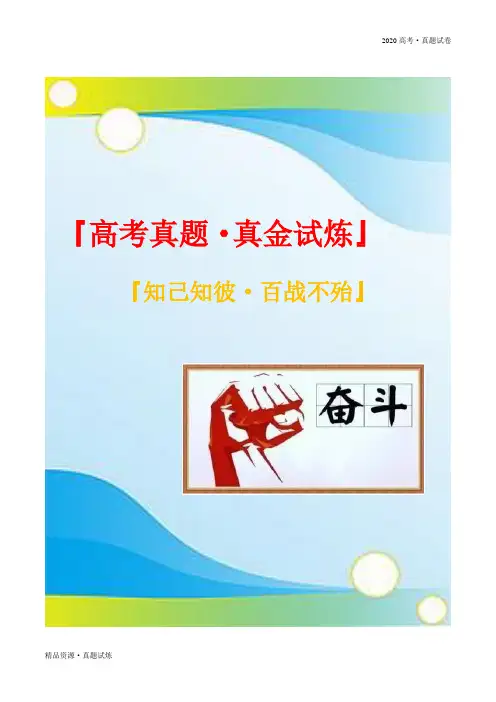
『高考真题·真金试炼』『知己知彼·百战不殆』英语试题第一部分听力(共两节, 满分20分)做题时, 先将答案标在试卷上。
录音内容结束后, 你将有两分钟的时间将试卷上的答案转涂到答题卡上。
第一节(共5小题; 每小题1分, 满分5分)听下面5段对话。
每段对话后有一个小题, 从题中所给的A、B、C三个选项中选出最佳选项, 并标在试卷的相应位置。
听完每段对话后, 你都有10秒钟的时间来回答有关小题和阅读下一小题。
每段对话仅读一遍。
例:How much is the shirt?A. £19.15.B. £59.18.C. £9.15.答案是C。
1. Where does the conversation probably take place?A. In a supermarket.B. In the post officeC. In the street.2. What did Carl do?A. He designed a medal.B. He fixed a TV set.C. He took a test.3. What does the man do?A. He's a tailor.B. He's a waiter.C. He's a shop assistant.4. When will the flight arrive?A. At18:20.B. At18:35.C. At18:50.5. How can the man improve his article?A. By deleting unnecessary words.B. By adding a couple of points.C. By correcting grammar mistakes.第二节(共15小题:每小题I分, 满分15分)听下面5段对话或独白。
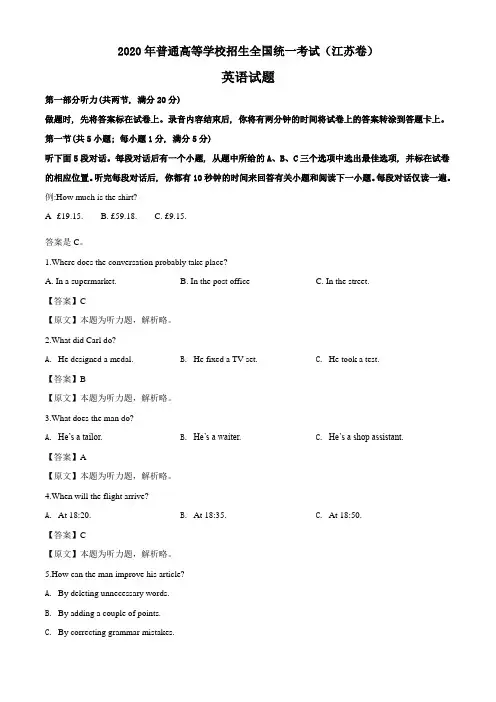
2020年普通高等学校招生全国统一考试(江苏卷)英语试题第一部分听力(共两节, 满分20分)做题时, 先将答案标在试卷上。
录音内容结束后, 你将有两分钟的时间将试卷上的答案转涂到答题卡上。
第一节(共5小题; 每小题1分, 满分5分)听下面5段对话。
每段对话后有一个小题, 从题中所给的A、B、C三个选项中选出最佳选项, 并标在试卷的相应位置。
听完每段对话后, 你都有10秒钟的时间来回答有关小题和阅读下一小题。
每段对话仅读一遍。
例:How much is the shirt? A.£19.15. B. £59.18. C. £9.15. 答案是C。
1.Where does the conversation probably take place? A. In a supermarket. B. In the post office C. In the street. 【答案】C 【原文】本题为听力题,解析略。
2.What did Carl do? A. He designed a medal. B. He fixed a TV set. C. He took a test. 【答案】B 【原文】本题为听力题,解析略。
3.What does the man do? A. He’s a tailor. B. He’s a waiter. C. He’s a shop assistant.【答案】A【原文】本题为听力题,解析略。
4.When will the flight arrive?A. At 18:20.B. At 18:35.C. At 18:50.【答案】C【原文】本题为听力题,解析略。
5.How can the man improve his article?A. By deleting unnecessary words.B. By adding a couple of points.C. By correcting grammar mistakes.【答案】A【原文】本题为听力题,解析略。
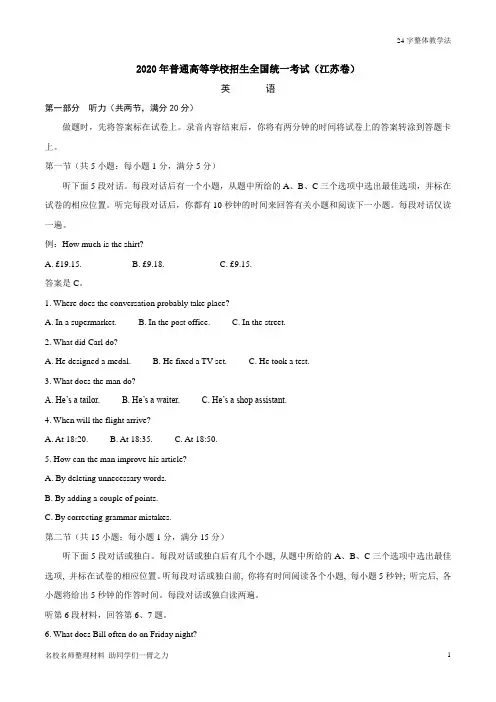
2020年普通高等学校招生全国统一考试(江苏卷)英语第一部分听力(共两节,满分20分)做题时,先将答案标在试卷上。
录音内容结束后,你将有两分钟的时间将试卷上的答案转涂到答题卡上。
第一节(共5小题;每小题1分,满分5分)听下面5段对话。
每段对话后有一个小题,从题中所给的A、B、C三个选项中选出最佳选项,并标在试卷的相应位置。
听完每段对话后,你都有10秒钟的时间来回答有关小题和阅读下一小题。
每段对话仅读一遍。
例:How much is the shirt?A. £19.15.B. £9.18.C. £9.15.答案是C。
1. Where does the conversation probably take place?A. In a supermarket.B. In the post office.C. In the street.2. What did Carl do?A. He designed a medal.B. He fixed a TV set.C. He took a test.3. What does the man do?A. He’s a tailor.B. He’s a waiter.C. He’s a shop assistant.4. When will the flight arrive?A. At 18:20.B. At 18:35.C. At 18:50.5. How can the man improve his article?A. By deleting unnecessary words.B. By adding a couple of points.C. By correcting grammar mistakes.第二节(共15小题;每小题1分,满分15分)听下面5段对话或独白。
每段对话或独白后有几个小题, 从题中所给的A、B、C三个选项中选出最佳选项, 并标在试卷的相应位置。
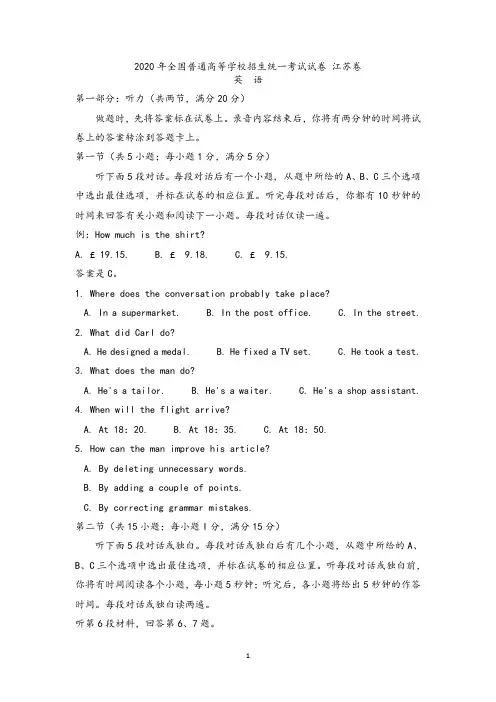
2020年全国普通高等学校招生统一考试试卷江苏卷英语第一部分:听力(共两节,满分20分)做题时,先将答案标在试卷上。
录音内容结束后,你将有两分钟的时间将试卷上的答案转涂到答题卡上。
第一节(共5小题;每小题1分,满分5分)听下面5段对话。
每段对话后有一个小题, 从题中所给的A、B、C三个选项中选出最佳选项,并标在试卷的相应位置。
听完每段对话后,你都有10秒钟的时间来回答有关小题和阅读下一小题。
每段对话仅读一遍。
例:How much is the shirt?A. £19.15.B. £ 9.18.C. £ 9.15.答案是C。
1. Where does the conversation probably take place?A. In a supermarket.B. In the post office.C. In the street.2. What did Carl do?A. He designed a medal.B. He fixed a TV set.C. He took a test.3. What does the man do?A. He's a tailor.B. He's a waiter.C. He's a shop assistant.4. When will the flight arrive?A. At 18:20.B. At 18:35.C. At 18:50.5. How can the man improve his article?A. By deleting unnecessary words.B. By adding a couple of points.C. By correcting grammar mistakes.第二节(共15小题;每小题I分,满分15分)听下面5段对话或独白。
每段对话或独白后有几个小题,从题中所给的A、B、C三个选项中选出最佳选项,并标在试卷的相应位置。
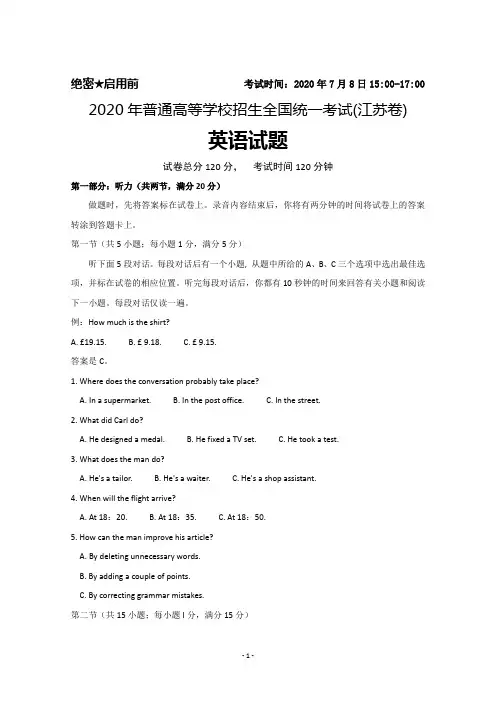
绝密★启用前考试时间:2020年7月8日15:00-17:00 2020年普通高等学校招生全国统一考试(江苏卷)英语试题试卷总分120分,考试时间120分钟第一部分:听力(共两节,满分20分)做题时,先将答案标在试卷上。
录音内容结束后,你将有两分钟的时间将试卷上的答案转涂到答题卡上。
第一节(共5小题;每小题1分,满分5分)听下面5段对话。
每段对话后有一个小题, 从题中所给的A、B、C三个选项中选出最佳选项,并标在试卷的相应位置。
听完每段对话后,你都有10秒钟的时间来回答有关小题和阅读下一小题。
每段对话仅读一遍。
例:How much is the shirt?A. £19.15.B. £ 9.18.C. £ 9.15.答案是C。
1. Where does the conversation probably take place?A. In a supermarket.B. In the post office.C. In the street.2. What did Carl do?A. He designed a medal.B. He fixed a TV set.C. He took a test.3. What does the man do?A. He's a tailor.B. He's a waiter.C. He's a shop assistant.4. When will the flight arrive?A. At 18:20.B. At 18:35.C. At 18:50.5. How can the man improve his article?A. By deleting unnecessary words.B. By adding a couple of points.C. By correcting grammar mistakes.第二节(共15小题;每小题I分,满分15分)听下面5段对话或独白。
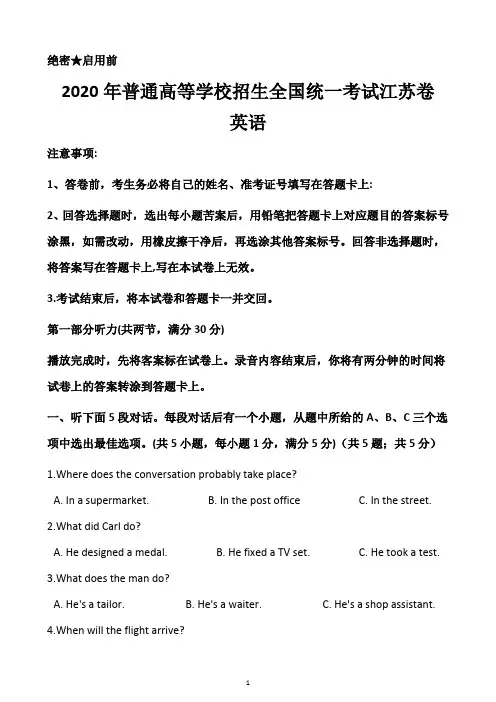
绝密★启用前2020年普通高等学校招生全国统一考试江苏卷英语注意事项:1、答卷前,考生务必将自己的姓名、准考证号填写在答题卡上:2、回答选择题时,选出每小题苦案后,用铅笔把答题卡上对应题目的答案标号涂黑,如需改动,用橡皮擦干净后,再选涂其他答案标号。
回答非选择题时,将答案写在答题卡上,写在本试卷上无效。
3.考试结束后,将本试卷和答题卡一并交回。
第一部分听力(共两节,满分30分)播放完成时,先将客案标在试卷上。
录音内容结束后,你将有两分钟的时间将试巷上的答案转涂到答题卡上。
一、听下面5段对话。
每段对话后有一个小题,从题中所给的A、B、C三个选项中选出最佳选项。
(共5小题,每小题1分,满分5分)(共5题;共5分)1.Where does the conversation probably take place?A. In a supermarket.B. In the post officeC. In the street.2.What did Carl do?A. He designed a medal.B. He fixed a TV set.C. He took a test.3.What does the man do?A. He's a tailor.B. He's a waiter.C. He's a shop assistant.4.When will the flight arrive?A. At 18:20.B. At 18:35.C. At 18:50.5.How can the man improve his article?A. By deleting unnecessary words.B. By adding a couple of points.C. By correcting grammar mistakes.二、听下面5段对话或独白。
每段对话或独白后有几个小题, 从题中所给的A、B、C三个选项中选出最佳选项。
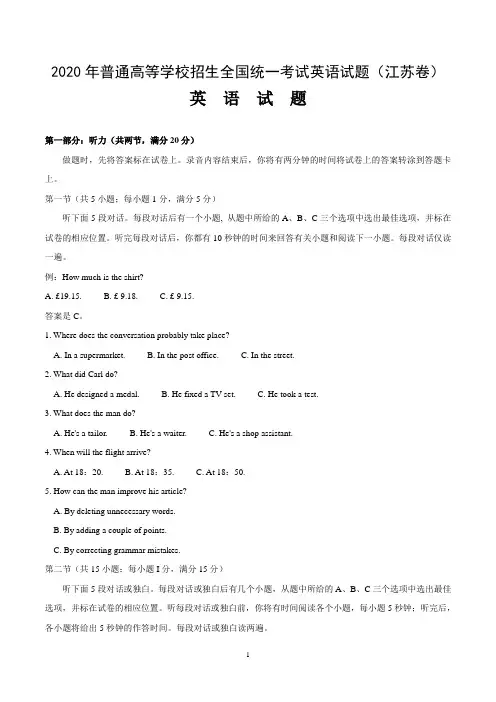
2020年普通高等学校招生全国统一考试英语试题(江苏卷)英语试题第一部分:听力(共两节,满分20分)做题时,先将答案标在试卷上。
录音内容结束后,你将有两分钟的时间将试卷上的答案转涂到答题卡上。
第一节(共5小题;每小题1分,满分5分)听下面5段对话。
每段对话后有一个小题, 从题中所给的A、B、C三个选项中选出最佳选项,并标在试卷的相应位置。
听完每段对话后,你都有10秒钟的时间来回答有关小题和阅读下一小题。
每段对话仅读一遍。
例:How much is the shirt?A. £19.15.B. £ 9.18.C. £ 9.15.答案是C。
1. Where does the conversation probably take place?A. In a supermarket.B. In the post office.C. In the street.2. What did Carl do?A. He designed a medal.B. He fixed a TV set.C. He took a test.3. What does the man do?A. He's a tailor.B. He's a waiter.C. He's a shop assistant.4. When will the flight arrive?A. At 18:20.B. At 18:35.C. At 18:50.5. How can the man improve his article?A. By deleting unnecessary words.B. By adding a couple of points.C. By correcting grammar mistakes.第二节(共15小题;每小题I分,满分15分)听下面5段对话或独白。

2020年普通高等学校招生全国统一考试英语试题(江苏卷,解析版)【名师简评】2020江苏卷英语试题紧扣英语高考考纲,试卷内容覆盖了高中英语所涉及的主干知识,以基础题为主,难度适中,突出词汇、阅读和表达能力的考查。
单项填空从词汇、短语、时态、固定句型等各方面进行考查,尤其注意语境化的考查,如第23、25和27题。
完型填空相对生词不多,注意上下文通读后选择,这样准确率会得到提高。
阅读理解涉及到细节、猜词、主旨、推断等各方面,要求考生有较强的阅读能力。
任务型阅读同2020年的高考试题相比,简单很多,难度不大,但要注意词性的变化。
书面表达要紧扣要点,适当增加情节并使用灵活多变的句式。
第一部分:听力(共两节,满分20分)做题时,先将答案标在试卷上。
录音内容结束后,你将有两分钟的时间将试卷上的答案转涂到答题卡上。
第一节(共5小题;每小题1分,满分5分)听下面5段对话。
每段对话后有一个小题,从题中所给的A、B、C三个选项中选出最佳选项,并标在试卷的相应位置。
听完每段对话后,你都有l0秒钟的时间来回答有关小题和阅读下一小题。
每段对话仅读一遍。
例:How much is the shirt?A.£19.15.B.£9.15.C. £9.18.答案是B。
1. What will Dorothy do on the weekend?A. Go out with her friend.B. Work on her paper.C. Make some plans.2. What was the normal price of the T-shirt?A. $15.B. $30.C. $50.3. What has the woman decided to do on Sunday afternoon?A. To attend a wedding.B. To visit an exhibition.C. T o meet a friend.4. When does the bank close on Saturday?A. At 1:00 pm.B. At 3:00 pm.C. At 4:00 pm.5. Where are the speakers?A. In a store.B. In a classroom.C. At a hotel.第二节(共15小题;每小题1分,满分15分)听下面5段对话或独白。
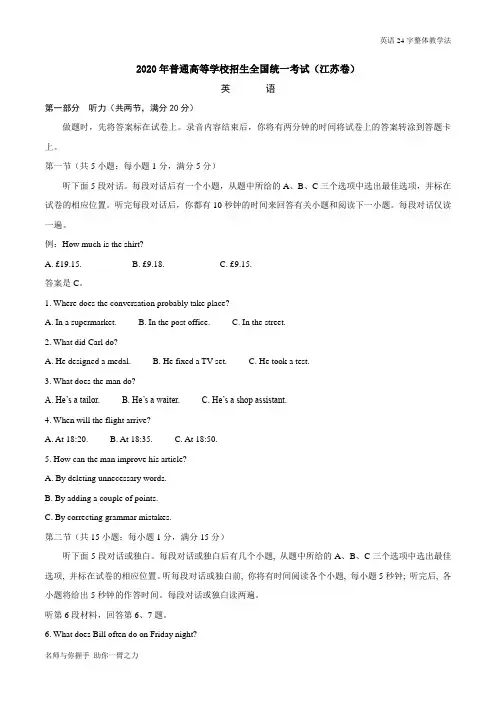
2020年普通高等学校招生全国统一考试(江苏卷)英语第一部分听力(共两节,满分20分)做题时,先将答案标在试卷上。
录音内容结束后,你将有两分钟的时间将试卷上的答案转涂到答题卡上。
第一节(共5小题;每小题1分,满分5分)听下面5段对话。
每段对话后有一个小题,从题中所给的A、B、C三个选项中选出最佳选项,并标在试卷的相应位置。
听完每段对话后,你都有10秒钟的时间来回答有关小题和阅读下一小题。
每段对话仅读一遍。
例:How much is the shirt?A. £19.15.B. £9.18.C. £9.15.答案是C。
1. Where does the conversation probably take place?A. In a supermarket.B. In the post office.C. In the street.2. What did Carl do?A. He designed a medal.B. He fixed a TV set.C. He took a test.3. What does the man do?A. He’s a tailor.B. He’s a waiter.C. He’s a shop assistant.4. When will the flight arrive?A. At 18:20.B. At 18:35.C. At 18:50.5. How can the man improve his article?A. By deleting unnecessary words.B. By adding a couple of points.C. By correcting grammar mistakes.第二节(共15小题;每小题1分,满分15分)听下面5段对话或独白。
每段对话或独白后有几个小题, 从题中所给的A、B、C三个选项中选出最佳选项, 并标在试卷的相应位置。
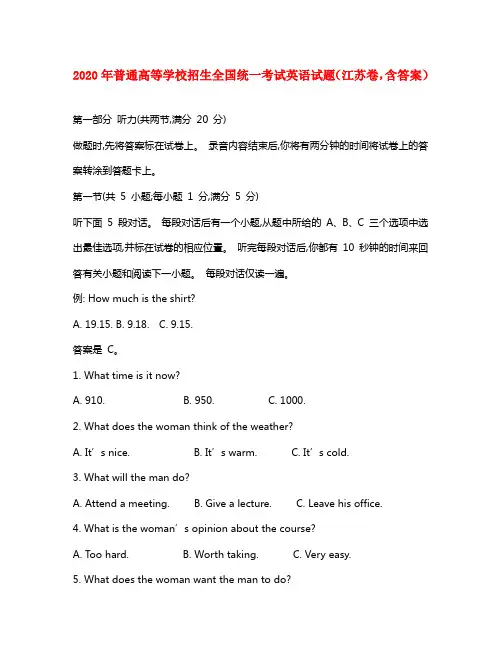
2020年普通高等学校招生全国统一考试英语试题(江苏卷,含答案)第一部分听力(共两节,满分20 分)做题时,先将答案标在试卷上。
录音内容结束后,你将有两分钟的时间将试卷上的答案转涂到答题卡上。
第一节(共5 小题;每小题1 分,满分5 分)听下面5 段对话。
每段对话后有一个小题,从题中所给的A、B、C 三个选项中选出最佳选项,并标在试卷的相应位置。
听完每段对话后,你都有10 秒钟的时间来回答有关小题和阅读下一小题。
每段对话仅读一遍。
例: How much is the shirt?A. 19.15.B. 9.18.C. 9.15.答案是C。
1. What time is it now?A. 910.B. 950.C. 1000.2. What does the woman think of the weather?A. It’s nice.B. It’s warm.C. It’s cold.3. What will the man do?A. Attend a meeting.B. Give a lecture.C. Leave his office.4. What is the woman’s opinion about the course?A. Too hard.B. Worth taking.C. Very easy.5. What does the woman want the man to do?A. Speak louder.B. Apologize to her.C. Turn off the radio.第二节(共15 小题;每小题1 分,满分15 分)听下面5 段对话或独白。
每段对话或独白后有几个小题,从题中所给的A、B、C 三个选项中选出最佳选项,并标在试卷的相应位置。
听每段对话或独白前,你将有时间阅读各个小题,每小题5 秒钟;听完后,各小题将给出5 秒钟的作答时间。
每段对话或独白读两遍。
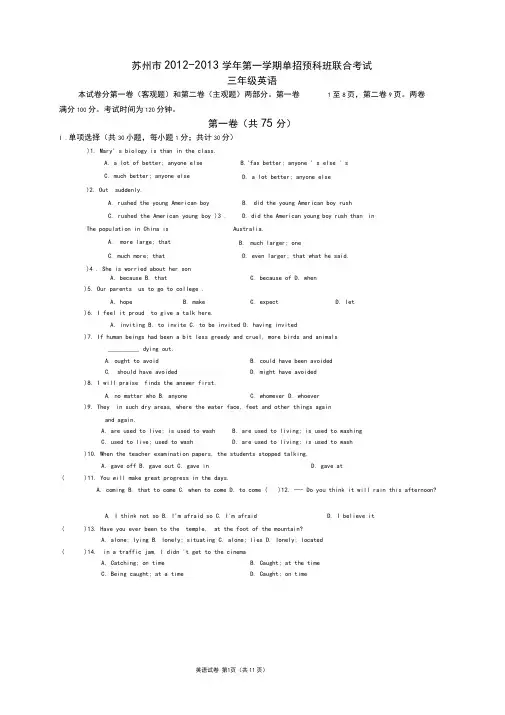
苏州市2012-2013学年第一学期单招预科班联合考试三年级英语本试卷分第一卷(客观题)和第二卷(主观题)两部分。
第一卷1至8页,第二卷9页。
两卷满分100分。
考试时间为120分钟。
第一卷(共75分)I .单项选择(共30小题,每小题1分;共计30分))1. Mary' s biology is than in the class.A. a lot of better; anyone elseC. much better; anyone else)2. Out suddenly.A. rushed the young American boyC. rushed the American young boy )3 . The population in China isA.more large; thatC. much more; that)4 . She is worried about her sonB.'fas better; anyone ' s else ' sD. a lot better; anyone elseB.did the young American boy rushD. did the American young boy rush than in Australia.B.much larger; oneD. even larger; that what he said.A. becauseB. thatC. because ofD. when)5. Our parents us to go to college .A. hopeB. makeC. expectD. let)6. I feel it proud to give a talk here.A. invitingB. to inviteC. to be invitedD. having invited)7. If human beings had been a bit less greedy and cruel, more birds and animals__________ dying out.A. ought to avoidB. could have been avoidedC.should have avoidedD. might have avoided)8. I will praise finds the answer first.A. no matter whoB. anyoneC. whomeverD. whoever)9. They in such dry areas, where the water face, feet and other things againand again.A. are used to live; is used to washB. are used to living; is used to washingC. used to live; used to washD. are used to living; is used to wash)10. When the teacher examination papers, the students stopped talking.A. gave offB. gave outC. gave inD. gave at( )11. You will make great progress in the days.A. comingB. that to comeC. when to comeD. to come ( )12. --- Do you think it will rain this afternoon?A. I think not soB. I'm afraid soC. I'm afraidD. I believe it( )13. Have you ever been to the temple, at the foot of the mountain?A. alone; lyingB. lonely; situatingC. alone; liesD. lonely; located( )14. in a traffic jam, I didn 't get to the cinemaA. Catching; on timeB. Caught; at the timeC. Being caught; at a timeD. Caught; on time( )15. --- Do remember to turn off the lights when you the classroom.—Yes, I.A. will leave; willB. leave; doC. leave; willD. left; did( )16. The faster anything goes up into the sky,A. it reaches the highestB. it reaches the higherC. the highest it reachesD. the higher it reaches( )17. He has a lot of lessons which .A. needs making upB. needs making up forC. need making upD. need making up for( )18. Why not your seat and do something useful to others?A. get downB. get outC. get upD. get off( )19. we had the boy!A. What hard time; found; losingB. What a hard time; finding; lostC. How good time; finding; missedD. How a good time; found; missing( )20. John is a lazy student, one of bad study habitsis to leave for tomorrow oughtto be done today. A . his; somethingB. whose; whatC. whom; that D . his; that()27. It is to spend money in preventing illnesses by promoting healthy living rather thanspending it trying to make people after they are ill. A . good; good B . well; better C. better; betterD . better; good()28. He wrote song, which turned out to be rather popular with young.A. the; theB. a;不填C. a; theD. the;不填( )29. Only until his father was out of prison,to school.()30. I wanted to have him the job, but she had it instead.A. do; doneB. does; doingC. to do; doingD. to do; done(((((()21. Did you hear the song on the radio again just now?A. playB. playingC. to be playedD. played)22. He likes to give people lift at his .A. a; convenientB. the; convenientC. a; convenienceD. the; convenience)23. If you are on a sidewalk near buildings when an earthquake, try to protect yourselffrom objects.A. hit; fallingB. strikes; falling)24. In the big fire, they struggled and finallyA. couldB. were able to)25. The plan is .A. worthy to be discussed C. worthwhile discussing)26. Three- fourths of the jobs today.A. has finishedC. happens; fellD. will come; fallen save themselves. C. wouldD. canB. worth being discussed D. worth to discussB. has been finishedC. have finishedD. have been finishedA. can Charles go C. could Charles goB. Charles can go D. Charles could gon .完形填空(共30小题,每小题0.5分;共计15分)AWhat is in the drug that makes you sick or dead? For example, cocaine is harmful, but what makes it harmful?I can' t tell you all about drugs, but I can 31 you think about them in this 32 way. Your body is a very complicated (复杂的) machine, really a lot of chemical machinery, all of which is finally turned 33 it all works together . Special chemicals, which we call drugs, can affect it in many different ways.Some drugs are 34 when your body has a problem, as with disease-causing bacteria. Then someone may give you aspirin to keep your temperature from going too 35 _____________________________________ or some penicillin (青霉素) 36 it stops the growth of some kinds of bacteria. 37, all drugs are really poison, 38 if you take too much ,so you must always use them carefully.Why do some people take drugs like cocaine? For a little while they seem to make you feel better, or happier .But after their effects have 39 ,your body has to pay an extra 40 to get back to normal. That makes you want to get some more of the drug.Drugs like cocaine have their special effects because they act as 41 for your nervous system. They cut off some of your nerve pathways and take away some of your senses and your 42 . They make you want always more. And just a little too much can even block nerves to your heart and stop its beating.Many of us worry about the 43 around us and what pollution does to us .How about your internal (内在的) environment, and what goes on 44 you ? You control that all by yourself in what you putinto your 45 . Most drugs are pollutants. You would not want pollutants in the air and water aroundyou. Why would you want pollutants in your body?( )31. A. make B. cause C. help D. let( )32. A. funny B. different C. simple D. true( )33. A . as if B. even if C. where D. so that( )34. A . powerful B. helpful C. painful D. helpless( )35. A . high B. tall C. much D. hot( )36. A . when B. until C. as D. before( )37. A . Besides B. Thus C. However D. Naturally( )38. A . at most B. at least C. at times D. at first( )39. A . worked B. worn C. appeared D. lost( )40. A . number B. quantity C. amount D. price( )41 . A. guards B. medicine C. chemicals D. poisons( )42. A . worries B. happiness C. freedom D. pride( )43. A . places B. nature C. people D. environment( )44. A . inside B. around C. outside D. next to( )45. A . heart B. head C. body D. mindBA Woman and a ForkThere was a young woman was diagnosed with a terminal illness and could only live three months. So as she was getting her things "in order," she 46 her Rabbi (法师) and had him come to her house to 47 certain aspects of her final wishes.She told him which songs she wanted sung at the conference, what scriptures she would like read, and what outfit she wanted to be buried in.Everything was in order and the Rabbi was preparing to leave 48 the young woman suddenly remembered something very important to her."There's one more thing," she said 49 . "What' that?" "This is very important, I want to be buried with a fork in my right hand."The Rabbi stood looking at the young woman, not knowing quite what to say.“Thatsurprises you, doesn't it? "the young woman asked. "Well, to be honest, I'm 50 by the request," said the Rabbi.The young woman 51 . “ Mygrandmother once told me this story, and from then on, I havealways done so. I have also, always tried to pass along its message to those I love and those who are in need of comfort.In all my years of attending socials and dinners, I always remember that when the dishes of the main 52 were being cleared, someone would inevitably lean over and say, 'Keep your fork.' It was my favorite part 53 I knew that something better was coming...like velvety chocolate cake or deep-dish apple __ ■ _”pie…So, I just want people to see me there in that casket (棺材)with a fork in my hand and I want them to 54 "What's with the fork?" Then I want you to tell them: "Keep your fork •••the best is yet to come.The Rabbi's eyes were filled up with tears of joy as he hugged the young woman good-bye. He knew this would be one of the last times he would see her before her death. But he also knew that the young woman had a better grasp of 55 than he did. She had a better grasp of 56 heaven would be like than many people twice her age, with twice as much experience and knowledge.She knew that something better was coming. At the funeral people were walking by the young woman's casket and they saw the cloak she was wearing and the fork 57 in her right hand. Over and over, the Rabbi heard the question "What's with the fork?" And over and over he 58 .During his message, the Rabbi told the people of the agreement he had with the young woman shortly before she died. He also told them about the fork and what it symbolized to _59_. The Rabbi told thepeople how he could not stop thinking about the _60— and told them that they probably would not beable to stop thinking about it either.He was right. So the next time you reach down for your fork, let it remind you ever so gently, that the best is yet to come.( )46. A. contracted B. contacted C. attracted D. attached( )47. A. talk B. identify C. recognize D. discuss( )48. A. before B. as C. when D. then( )49. A. excitedly B. regretfully C. angrily D. breathlessly( )50. A. surprised B. astonished C. depressed D. puzzled( )51. A. explained B. introduced C. admitted D. hesitated( )52. A. meal B. course C. food D. cause( )53. A. so B. and C. yet D. because( )54. A. wonder B. question C. enquire D. say( )55. A. life B. funeral C. fork D. heaven( )56. A. how B. where C. what D. which( )57. A. placed B. grasped C. held D. caught( )58. A. sobbed B. cried C. smiled D. laughed( )59. A. her B. him C. them D. people( )60. A. woman B. funeral C. incident D. fork出.阅读理解(共15小题,每小题2分;共计30分)ABeijing ---- A recent Chinese blockbuster (轰动的作品)“AWorld Without Thieves "is based on the experiences of a young migrant worker (民工)carrying 60,000 yuan on a train packed with thieves. But while the image of a warm-hearted but somewhat naive migrant worker may have made film fans chuckle, it ' s a sure bet that most of China ' s migrant workers are yet to step into a cinema to admire it.“Fortyyuan a ticket? I can ' Afford it, said Shen Jie, a migrant worker at a construction site in Dongzhimen, east Beijing.Shen found it hard to remember when he last watched a film, or what it was about. "It must years ago, “ he said.Though they are the builders of the nation ' s theaters and cinemas, a limited cultural life is commonamong China ' s 120 million migrant workers.Shen arrived from East China ' Zhejiang Province in1991. Life was better then; money seemed to come more easily. " Now, as more and more workers are rushing to the capital, it ' s too hard to e and none of us dare think about watching films, " he said.For many like Shen, the dream is earning enough to pay for their children ' s education so they jobs in the cities and say goodbye to the hardships of rural life forever. This drives them to work hard and save as much as possible.With a monthly salary of less than 500 yuan, Shen has to send money home to his little son and silver-haired parents.In Shen ' s small dormitory, which he shares with seven other (-workers, there is a well-thumbed copy of a magazine published in 1998.A recent survey by local media revealed_(显示)_______ that 80 percent of migrant workers spent their sparetime sleeping and chatting because of exhaust and a lack of income. The same survey found that 47 percent of migrant workers have to workfor more than 10 hours a day. Around 40 percent do not even possess a book, and nearly 60 percent say they are dissatisfied with their cultural life.Like many of Shen' so-workers, reading newspapers and hanging out in Beijing 'stseets provide evening entertainment.From China Daily ( )61. We can infer from the passage “ A World Without Thieves " is a film that.A.talks about experiences of a group of thievesB.deals with the life of migrant workersC.explains how to catch thieves on trainsD.attracts many migrant workers( )62. As for the migrant worker, Shen Jie,.A.life was harder when he first came to work in BeijingB.he enjoyed a lot of films ten years agoC.his wish was to pay for his son ' s educationthe capital is too hard a place for him to make any money ( )63. According the passage, which of the following is TRUE.A.the workers enjoy reading very much, no matter how old the magazines areB.the workers have so little to read that they often read the same magazine again and againC. the workers enjoy magazinesbecause they are easy to understandD. the workers think highly of the copy of the magazine published in 1998 ( )64. The main idea of this passage is that migrant workers.A. lack cultural experiencesB. are not very well-paid in BeijingC.are looked down upon by city peopleD. need the government ' s attentionBAt dinner the president of the university talked about the wonderful activities on campus including guest lectures and social gatherings.He also made it perfectly clear that free food would be offered at all future events. He continued with explanations of professors, and I began to realize that this school, though not as good as my first choice, might be the best one for me. It seemed to have many great programs. It seemed challenging yet caring.As the president ended his speech, we clapped politely and pushed back our chairs. As I walked out of that door, a feeling of comfort washed over me. Looking at the campus that night, I realized that I would be spending the next four years right there.In all honesty, my university is not as well-known as my dream“ university. However, it turned out to be the right choice of schools for me.( )65. We can learn from the passage that the author was.A. a boyB. a girlC. a presidentD. glad to choose the university.( )66. The university was.A. a leading schoolB. world-famousC. comfortable, challenging and caringD. not good at allCThe following are four kinds of medicine. How to use the medicine is very important. Never take some by mistake.Take the medicine with water, followed by one tablet every eight hours, as required. For further nighttime and early morning, take two tablets at bedtime. Do not take more than six tablets in 24 hours. For children between six and twelve years old, give half the adult dosage (齐U量).For children under six years old, go to your doctor for advice. Reduce dosage if nervousness, restlessness or sleeplessness takes place.( )67. If a little child under six has a fever, it ' s suggested that he.A. take two tablets before sleepB. stop to take another pillC. take one tablet before sleepD. go to see a doctor( )68. Obviously a kind of medicine mentioned above isn ' proper for , judging from theinformation.A. children over twelve years oldB. some adults of 18 years oldC. some old persons with heart attackD. neither adults nor children( )69. When an adult has a cold, he had better.A.have as many as fifteen pills a dayB. have twice a dayC. have four times a dayD. have nine pills a day( )70. How many kinds of medicine can be taken by children of seven years old?A. Two kinds.B. Three kinds.C. None.D. Four kinds.DHave you ever been ill? When you are ill, you must be unhappy because your body becomes hot, and there are pains all over your body. You don t want to work, you stay in bed, feeling very sad.What makes us ill? It is germs. Germs are everywhere. They are very small and you can t find them with your eyes, but you can see them with a microscope. They are very small and there could be hundreds of them on a very small thing.Germs are always found in dirty water. When we look at dirty water under the microscope, we shall see them in it. So your father and mother will not let you drink dirty water.Germs aren t found only in water. They are found in air and dust. If you cut your finger , if some of the dust from the floor goes into the cut, some of the germs would go into your finger. Your finger would become big and red, and you will have much pain in it. Sometimes the germs would go into all of your body, and you would have pain everywhere.( )71. What is a microscope used for?A. Making very small things look much bigger.B.Making very big things look much smaller.C.Helping you read some newspapers.D.Helping you if you can t see things clearly.( )72. Which of the following is NOT true?A.Germs can be found both in water and in the air.B.Germs can go into your finger if it is cut.C.If your temperature is not OK, there must be germs in your body.D.If your finger isn t cut, th ere aren t aH y germs on it.( )73. What s' the main idea of the passage?A. Germs may make us ill.B. Germs are in dirty water.C. Don t drink dirty water.D. Take care of your fingers.EPeople living in the country enjoy several advantages that people living in the city cannot enjoy.They are in close contact with nature. They make friends with trees and stones. They breathe fresh air. They fight with strong winds. They listen to the song of birds.This contact with nature is good for health. There are many diseases that are common in the city, but are not to be found in the country. For example, near-sightedness is almost unknown to country people.Because of the absence of cars, one can walk more freely in the country than in the city. There are no rules of the road or traffic signs to obey.People living in the country can easily get fresh vegetables, fresh fruit and fresh milk, and they get them at lower prices than in the city.Country life is economical in other ways, too. There are practically no temptations to waste money.Country people are mostly honest. They say what they mean, and make and keep promises with sincerity. They do not put on air. They do not pretend to have those ridiculous manners which are necessary in what we call polite society.( )74. What is NOT true of country life?A.The traffic accident rate is very high in the country.B.Living in the country saves one a lot of money.C.Country people enjoy better health than the city people.D.Country people are mostly honest.( )75. Which of the following statements is true according to the passage?A.People living in the country enjoy no advantages.B.People living in the city are in close contact with nature.C.People living in the country suffer from more diseases than those living in the cityD.The prices of farm products are lower in the country than in the city.苏州市2012-2013学年第一学期单招预科班联合考试三年级英语第二卷(共25分)W.翻译(共5小题,每小题2分;共计10分)下列5个句子均选自第出部分的短文,即文中划线部分。
2020年普通高等学校招生全国统一考试(江苏卷)英语第二部分:英语知识运用(共两节,满分35分)第一节:单项填空(共15小题;每小题1分,满分15分)请认真阅读下面各题,从题中所给的A、B、C、D四个选项中,选出最佳选项。
例:It is generally considered unwise to give a child _______ he or she wants.A. howeverB. whateverC. whicheverD. whenever答案是B。
21. By boat is the only way to get here, which is _______ we arrived.A. whereB. whenC. whyD. how解析:考查名词性从句。
句意:乘船是到达这里唯一的途径,这就是我们如何到达的。
分析which引导的非限定性定语从句可知,后面为表语从句。
分析句意可知,这里用连接副词how引导表语从句,充当方式状语,表示“如何”。
故选D。
答案:D22. Kids shouldn’t have access to violent films because they might _______ the things they see.A. indicateB. investigateC. imitateD. innovate解析:考查动词词义辨析及语境理解。
句意:孩子不应该接触暴力电影,因为他们也许会模仿他们所见的事情。
A. indicate指示;B. investigate调查;C. imitate模仿;D. innovate改革。
故选C。
答案:C23. Self-driving is an area _______ China and the rest of the world are on the same starting line.A. thatB. whereC. whichD. when解析:考查定语从句。
2020年全国普通高等学校招生统一考试试卷江苏卷英语第一部分:听力(共两节,满分20分)做题时,先将答案标在试卷上。
录音内容结束后,你将有两分钟的时间将试卷上的答案转涂到答题卡上。
第一节(共5小题;每小题1分,满分5分)听下面5段对话。
每段对话后有一个小题, 从题中所给的A、B、C三个选项中选出最佳选项,并标在试卷的相应位置。
听完每段对话后,你都有10秒钟的时间来回答有关小题和阅读下一小题。
每段对话仅读一遍。
例:How much is the shirt?A. £19.15.B. £ 9.18.C. £ 9.15.答案是C。
1. Where does the conversation probably take place?A. In a supermarket.B. In the post office.C. In the street.2. What did Carl do?A. He designed a medal.B. He fixed a TV set.C. He took a test.3. What does the man do?A. He's a tailor.B. He's a waiter.C. He's a shop assistant.4. When will the flight arrive?A. At 18:20.B. At 18:35.C. At 18:50.5. How can the man improve his article?A. By deleting unnecessary words.B. By adding a couple of points.C. By correcting grammar mistakes.第二节(共15小题;每小题I分,满分15分)听下面5段对话或独白。
每段对话或独白后有几个小题,从题中所给的A、B、C三个选项中选出最佳选项,并标在试卷的相应位置。
2020年普通高等学校招生全国统一考试英语(江苏卷,含答案)第一部分:听力(共两节,满分20分)做题时,先将答案标在试卷上。
录音内容结束后,你将有两分钟的时间将试卷上的答案转涂到答题卡上。
第一节(共5小题;每小题1分,满分5分)听下面5段对话。
每段对话后有一个小题,从题中所给的A、B、C三个选项中选出最佳选项,并标在试卷的相应位置。
听完每段对话后,你都有10秒钟的时间来回答有关小题和阅读下一小题。
每段对话仅读一遍。
例:How much is the shirt?A. £19.15.B. £9.15.C. £9.18.答案是B。
1. What do the speakers need to buy?A. A fridge.B. A dinner table.C. A few chairs.2. Where are the speakers?A. In a restaurant.B. In a hotel.C. In a school.3. What does the woman mean?A. Cathy will be at the party.B. Cathy is too busy to come.C. Cathy is going to be invited.4. Why does the woman plan to go to town?A. To pay her bills in the bank.B. To buy books in a bookstore.C. To get some money from the bank.5. What is the woman trying to do?A. Finish some writing.B. Print an article.C. Find a newspaper.第二节(共15小题;每小题1分,满分15分)听下面5段对话。
每段对话后有几个小题,从题中所给的A、B、C三个选项中选出最佳选项,并标在试卷的相应位置。
绝密★启用前江苏省2020年普通高等学校招生全国统一考试英语试题第一部分:听力(共两节,满分20分)做题时,先将答案标在试卷上。
录音内容结束后,你将有两分钟的时间将试卷上的答案转涂到答题卡上。
第一节(共5小题;每小题1分,满分5分)听下面5段对话。
每段对话后有一个小题, 从题中所给的A、B、C三个选项中选出最佳选项,并标在试卷的相应位置。
听完每段对话后,你都有10秒钟的时间来回答有关小题和阅读下一小题。
每段对话仅读一遍。
例:How much is the shirt?A. £19.15.B. £ 9.18.C. £ 9.15.答案是C。
1. Where does the conversation probably take place?A. In a supermarket.B. In the post office.C. In the street.2. What did Carl do?A. He designed a medal.B. He fixed a TV set.C. He took a test.3. What does the man do?A. He's a tailor.B. He's a waiter.C. He's a shop assistant.4. When will the flight arrive?A. At 18:20.B. At 18:35.C. At 18:50.5. How can the man improve his article?A. By deleting unnecessary words.B. By adding a couple of points.C. By correcting grammar mistakes.第二节(共15小题;每小题I分,满分15分)听下面5段对话或独白。
精品文档,名师推荐!来源网络,造福学生———————欢迎下载,祝您学习进步,成绩提升———————-------------在--------------------此--------------------卷--------------------上--------------------答--------------------题--------------------无--------------------效------------精品文档,名师推荐!来源网络,造福学生———————欢迎下载,祝您学习进步,成绩提升———————精品文档,名师推荐!来源网络,造福学生———————欢迎下载,祝您学习进步,成绩提升———————精品文档,名师推荐!来源网络,造福学生———————欢迎下载,祝您学习进步,成绩提升———————精品文档,名师推荐!来源网络,造福学生———————欢迎下载,祝您学习进步,成绩提升———————第19页(共20页)第20页(共20页)well-made film provides foreign audiences with a fresh way of better knowing China's past and present.Documentaries about China,produced either in China or in other countries,are becoming increasingly popular among foreigners.For one thing,the overall development over the past decades has been so striking that they feel eager to familiarize themselves with what is going on in China.For another,China enjoys a long history and rich culture.It has always been an attractionfor those who are keen on anything that is Chinese.These documentaries present a splendid picture of China in front of their audiences —it history,landscape,art,food,or even traditional Chinese medicine.Because of these films,some foreigners have begun to think of coming to China.In this way,they can form a true picture of China themselves.(150words)毕业学校_____________姓名_____________准考证号_________________________________________________________________。